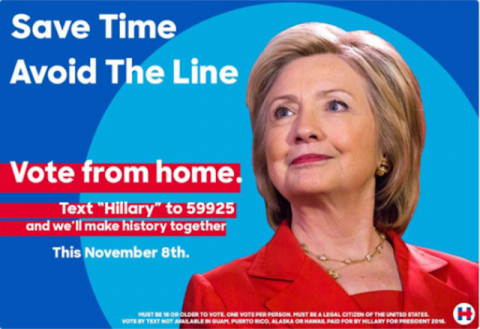A Digital Form of Voter Suppression

By: Faith Gingrich-Goetz
Ads rolled out on Twitter this past week that encouraged voters to vote for Democratic presidential nominee, Hillary Clinton, from home by texting in their vote. The ads said things such as “Save Time” “Avoid The Line” “Text ‘Hillary’ to 59925 and we’ll make history together” and one was even released in Spanish. Each ad featured mentions that it was “Paid for by Hillary for President 2016” and some directed voters to hillaryclinton.com.
The ads have since been removed, but screenshots and photographs have still been making their way around social media. When the number is texted with “Hillary,” one receives a response that says “The ad you saw was not approved by iVisionMobile.com OR Hillary For America in any way. To opt-in to the real HFA list, text HFA to 47246. Reply STOP to cancel.”
It is questionable whether this could be seen as voter intimidation, which would make it a violation of the Voting Rights Act. 52 U.S.C. § 10307(b) - Prohibited acts, Intimidation, Threats, or Coercion. Otherwise, providing misinformation to voters is likely not technically illegal.
This suppression seemed to be aimed at young voters, Hispanic voters, and voters who live in large urban areas that anticipated long lines. According to The Center for Information and Research on Civic Learning and Engagement (CIRCLE), only 45% of young people aged 18-29 voted in the 2012 presidential election and that dropped to 19.9% in 2014. According to Census reports, only 43.1% of Hispanic adults voted in the 2012 presidential election and that dropped to 21.1% in 2014. These are two groups that are easy targets for voter suppression and this ad was a direct approach aimed at them.
It is not clear who started the fake ads, but they were shared by many Clinton supporters as well as a great deal of right wing Twitter accounts.
Photo from: http://www.digitaltrends.com/social-media/twitter-clinton-vote/
